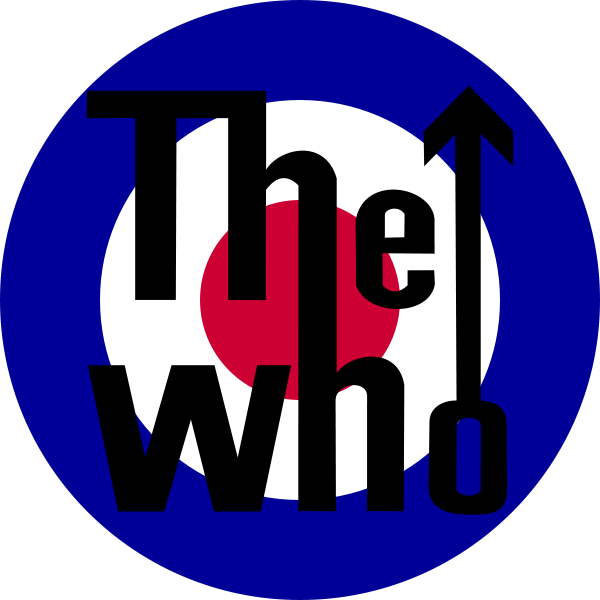| In the
annals of rock history the Who (like their contemporaries the Beatles
and the Rolling Stones) stand alone. Though technically they were Mods
and musically self-proclaimed "Maximum R&B," the Who were also the
godfathers of punk, the pioneers of rock opera, and among the first rock
groups to integrate (rather than merely fiddle with) synthesizers. The
smashed guitars and overturned (or blown up) drum kits they left in
their wake fittingly symbolized the violent passions of a band whose
distinctive sound was born of the couplings and collisions among Pete
Townshend's alternately raging or majestic guitar playing, Keith Moon's
nearly anarchic drumming style, John Entwistle's facile, thundering bass
lines, and Daltrey's impassioned vocals. The Who would prove a strong
influence on such late-1970s groups as the Jam. Ever since guitarist and
main songwriter Pete Townshend declared in "My Generation," "Hope I die
before I get old," he has been embraced as a spokesman, a role he
assumed (he claims) reluctantly. Nonetheless, for the rest of his career
with the Who Townshend explored rock's philosophical topography, from
the raw rebelliousness of "My Generation" and adolescent angst of "I
Can't Explain" to such ambitious, emotionally rich, and beautiful songs
as "Love Reign O'er Me."
All four band members grew up around London
Townshend, Daltrey, and Entwistle in the working-class Shepherd's Bush
area. Townshend's parents were professional entertainers. He and
Entwistle knew each other at school in the late-1950s and played in a
Dixieland band when they were in their early teens, with Townshend on
banjo and Entwistle on trumpet. They played together in a rock band, but
Entwistle left in 1962 to join the Detours. That band included Roger
Daltrey, a sheet-metal worker. When the Detours needed to replace a
rhythm guitarist, Entwistle suggested Townshend, and Daltrey switched
from lead guitar to vocals when the original singer, Colin Dawson, left
in1963. Not long after that, drummer Doug Sandom was replaced by Moon,
who was then playing in a surf band called the Beachcombers. By early
1964 the group had changed its name to the Who, and not long after, the
excitement inspired by Townshend's bashing his guitar out of frustrating
during a show ensured it would become a part of the act.
Shortly thereafter, the group came under the wing of manager Pete Meaden,
who renamed them the High Numbers and gave them a better-dressed Mod
image. The High Numbers released an unsuccessful single, "I'm the Face"
b/w "Zoot Suit" (both written by Meaden), then got new managers, former
small-time film directors Kit Lambert and Chris Stamp. By late 1964 the
quartet became the Who again, and with Lambert and Stamp's encouragement
they became an even more Mod band, with violent stage show and a
repertoire including blues, James Brown, and Motown covers, solely
because their Mod audiences loved that music. In fact, despite the
billing, the Who's original songs were anything but classic R&B. The
group's demo of "I Can't Explain," with sessionman Jimmy Page adding
guitar, brought them to producer Shel Talmy (who had also worked with
the Kinks) and got them a record deal. When "I Can't Explain" came out
in January 1965, it was ignored until the band appeared on the TV show
Ready, Steady, Go. Townshend smashed his guitar, Moon overturned
his drums, and the song eventually reached Number Eight in Britain.
"Anyway, Anyhow, Anywhere" also reached the British Top Tem, followed in
November 1965 by "My Generation." It went to Number Two in the U.K. but
only reached Number 75 in the U.S. But the Who were already stars in
Britain, having established their sound and their personae. Townshend
played guitar with full-circle windmilling motions, Daltrey strutted
like a bantam fighter, Entwistle (whose occasional songwriting effort
revealed a macabre sense of humor) just stood there seemingly unmoved as
Moon happily flailed all over his drum kit.
After the Who's fourth hit single, "Substitute" (Number 5 U.K.), Lambert
replaced Talmy as producer. Their second album, A Quick One (While
He's Away) (Happy Jack in the U.S.; Number 67, 1967),
included a 10-minute mini-opera as the title track, shortly before the
Beatles' concept album Sgt. Pepper's Lonely Heart Club Band. The
Who also began to make inroads in the U.S. with "Happy Jack" (Number 24,
1967) and a tour that included the performance filmed at the Monterey
Pop Festival in June.
The Who Sell Out (Number 48, 1967) featured mock-advertisement
songs and genuine jingles from offshore British pirate radio stations;
it also contained another mini-opera, "Rael," and a Top Ten hit in
England and the U.S., "I Can See for Miles." In October 1968 the band
released Magic Bus (Number 39, 1968), a compilation of singles
and B-sides, while Townshend worked on his 90 minute opus, Tommy.
The story of a deaf, dumb, and blind boy turned pinball champion-pop
idol turned autocratic messianic guru was variously considered both
pretentious and profound. Most important, however, Tommy was the
first successful rock opera. The album hit Number Four in the U.S., and
its first single, "Pinball Wizard," went to Number 19. The band would
perform Tommy in its entirety a handful of times -at London's
Coliseum in 1969, at New York City's Metropolitan Opera House on June
6th and 7th, 1970, and on some dates during its 1989 reunion tour.
Excerpts, including "See Me, Feel Me," "Pinball Wizard," and the
instrumental "Underture," were thereafter part of the live show. Troupes
mounted productions of it around the world (the Who's performances had
been concert versions), and Townshend oversaw a new recording of it in
1972, backed by the London Symphony and featuring Rod Stewart, Steve
Winwood, Sandy Denny, and Richard Burton, among others. In 1975 Ken
Russell directed the controversial high-pop film version, which included
Eric Clapton ("Eyesight to the Blind"), Tina Turner ("Acid Queen"), and
Elton John ("Pinball Wizard"), as well as Ann-Margret, Oliver Reed, and
Jack Nicholson. Moon (as the lecherous Uncle Ernie) and Daltrey (in the
lead title role) also appeared in the film.
Bits of Tommy turned up on Live at Leeds (Number Four,
1970), a juggernaut live set, which was followed by Who's Next
(Number Four, 1971), a staple of FM rock radio. It included Townshend's
first experiments with synthesizers "Baba O'Riley," "Bargain," "Won't
Get Fooled Again" three songs that Townshend originally conceived as
part of another rock opera entitled Lifehouse. The singles comp
Meaty, Beaty, Big, and Bouncy (Number 11, 1971) was followed two
years later by the Who's second double-album rock opera, Quadrophenia
(Number Two, 1973), a tribute to the tortured inner life of the Mods. It
too was a hit and became a movie directed by Franc Roddam in 1979, with
Sting of the Police in the wordless role of the bellboy.
While the Who were hugely popular, Quadrophenia signaled that
Townshend was now a generation older than the fans he had initially
spoken for. As he agonized over his role as an elder statesman of rock
as he would do for years to come the Who released Odds and Sods
(Number 15, 1974), a compilation of the previous decade's outtakes.
The Who by Numbers (Number Eight, 1975) was the result of
Townshend's self-appraisal ("However Much I Booze"); it lacked the Who's
usual vigor, but yielded a hit single in "Squeeze Box" (Number 16,
1975). The band could dependably pack arenas wherever it went, but it
took some time off the road after By Numbers.
The group members whose personality clashes are almost as legendary as
their music began pursuing more individual projects. Moon released a
novelty solo disc, Two Sides of the Moon, which featured guest
stars galore; Entwistle recorded two solo LPs with bands called Ox and
Rigor Mortis. Daltrey also recorded solo; his first two efforts are
widely regarded as mediocre and he only had one Top 40 hit in the U.S.,
"Without Your Love," from the McVicar soundtrack. The
Townshend-penned "After the Fire" received substantial video exposure
when released in 1985. Daltrey found considerably more success as an
actor. Besides Tommy, he starred in Ken Russell's over-the-top
"biography" of composer Franz Liszt, Lisztomania (1975) and
McVicar (1980), the true story of the famous British criminal John
McVicar. In the mid-1980s he played the double role of the Dromio twins
in a PBS production of Shakespeare's A Comedy of Errors. He's
also appeared on the London stage (The Beggar's Opera, 1991) and
on British television (The Little Match Girl, 1990). In 1999 he
played Scrooge in a stage version of Charles Dickens's A Christmas
Carol in New York City.
In 1970 Townshend contributed four tracks to Happy Birthday, a
privately released, limited edition album recorded as a tribute to
Townshend's guru, Meher Baba. The following year, I Am, a similar
limited-edition Baba tribute album, was released. It contained another
Townshend track, a nine-minute instrumental version of "Baba O'Riley."
As both these records were heavily bootlegged, Townshend's response was
to create an "offical" version of both albums. The result, Who Came
First (Number 69, 1972), was Townshend's first "real" solo album. It
included the tracks from Happy Birthday and I Am, plus new
songs, and demos of the Who tracks "Pure and Easy" and "Let's See
Action." His second solo release was a collaboration with ex-Faces
Ronnie Lane, Rough Mix (Number 45, 1977), which featured a number
of FM/AOR radio staples: "Street in the City," "My Baby Gives It Away,"
and "A Heart to Hang on To."
Meanwhile, punk was burgeoning in Britain, and the Sex Pistols among
others were brandishing the Who's old power chords and attitude.
Townshend's continuing identity crisis showed up in the title of Who
Are You (Number Two, 1978), but the title song became a hit single
(Number 14) that fall, and the album went double platinum. It was the
last and highest-charting album of the original band.
The next few years brought tragedy and turmoil, and in a sense, the end
of the Who in the death of Keith Moon. Moon always reveled in his
reputation as the madman of rock, and his outrageous stunts, onstage and
off, were legend. His prodigious drinking and drug abuse (he was once
paralyzed for days after accidentally ingesting an elephant
tranquilizer) had begun to diminish his playing ability. In 1975 he left
England for L.A., where he continued to drink heavily. He returned to
England and was trying to kick his alcoholism, but on September 7, 1978,
Moon died of an overdose of a sedative, Heminevrin, that had been
prescribed to prevent seizures induced by alcohol withdrawal. Although
the group continued for another three years, each of the three surviving
original members has stated repeatedly that the Who was never the same
again.
In 1979 the Who oversaw a concert documentary of their early years,
The Kids Are Alright (soundtrack, Number Eight, 1979), and worked on
the soundtrack version of Quadrophenia (Number 46, 1979), which
also included a number of Mod favorites performed by the original
artists (such as Booker T. & the M.G.'s' "Green Onions" and James
Brown's "Night Train"). Kenney Jones, formerly of the Small Faces,
replaced Moon, and session keyboardist John "Rabbit" Bundrick began
working with the Who. The new lineup toured, but tragedy struck again
when 11 concert goers were killed trampled to death or asphyxiated
in a rush for "festival seating" spots at Cincinnati's Riverfront
Coliseum on December 3, 1979. The incident occurred before the show, and
the group wasn't told of it until afterward.
After 15 years with Decca/MCA, the Who signed a band contract with
Warner Bros., and Townshend got a solo deal with Atco. His Empty
Glass (Number Five, 1980) included the U.S. Top 10 hit "Let My Love
Open the Door" and "Rough Boys," a song long believed to have been an
angry reply to a punk musician who had insulted the Who during an
interview. Much later, in a 1989 interview with writer Timothy White,
Townshend denied that was the case, saying, "It's about homosexuality,"
and adding that "And I Moved" was as well. Townshend's admission of
having "had a gay life," and the statement "I know how it feels to be a
woman because I am a woman," came as a surprise to many,
including his band mates.
In 1981 Townshend performed solo with an acoustic guitar at a benefit
for Amnesty International, which was recorded as The Secret
Policeman's Ball. His falling asleep onstage was the first public
sign of his deepening drug addiction. Since the year before, Townshend
had been abusing alcohol, cocaine, and freebase cocaine mixed with
heroin. He subsequently developed an addiction to Ativan, a tranquilizer
he was prescribed during treatment for alcoholism. Ativan combined with
freebase and heroin resulted in a highly publicized, near-fatal overdose
during which he was rushed to the hospital from a London club. Townshend
subsequently underwent electro-acupuncture treatment and cleaned up in
1982.
Amid all this, the revamped Who soldiered on. Face Dances (Number
Four, 1981) included the hit single "You Better You Bet" (Number 18,
1981) and "Don't Let Go the Coat." But Townshend later called the new
lineup's debut album a disappointment. One month after Face Dances
came out, the Who's former producer/manager, Kit Lambert, died after
falling down a flight of stairs; he was 45. (Pete Meadon had died three
weeks before Moon, in 1978.) Townshend released the wordy All the
Best Cowboys Have Chinese Eyes (Number 26, 1982), and soon followed
it with the group's It's Hard (Number Eight, 1982), an album
Daltrey has since been quoted as saying should never have been released.
It produced the group's last Top 30 hit to date, "Athena" (Number 28).
The Who then embarked on what they announced would be their last tour,
ending with a concert in Toronto on December 17, 1982. Although the
group officially broke up then, the Who have reunited to perform several
times since. They appeared at Live Aid in 1985 and at a U.K.
music-awards program in 1988. They celebrated the group's silver
anniversary in 1989 with a 43-date tour of the U.S. which included
guest-star-studded performances of Tommy in L.A. and New York,
and later in London. For this tour Jones was replaced by session drummer
Simon Phillips. It was also during this tour that Townshend, whose
hearing was extremely damaged from years of listening to loud music
through headphones, had to play standing behind a plastic baffle to
block the onstage noise.
Townshend also released a number of solo projects throughout the 1980s:
Scoop (Number 35, 1983) and Another Scoop (Number 198,
1987) collect demo tapes, home recordings, and sundry tracks of
historical interest to fans. White City a Novel (Number 26,
1985) is a concept piece, the soundtrack to a long-form video of the
same title and includes "Face the Face"; The Iron Man: The Musical
is the star-studded (Daltrey, Nina Simone, John Lee Hooker) soundtrack
to Townshend's rock opera based on a children's story by poet Ted
Hughes. Deep End Live!, released with an accompanying live video,
barely scraped into the Top 100.
Townshend wrote in the liner notes to the 1994 box-set career
retrospective Thirty Years of Maximum R&B: "I don't like the Who
much . . . " Through the years of his derisive attitude toward the group
has rung false at worst, disingenuous at best. In fact, Townshend's
pride (and joy) in performing with the Who was abundantly clear during
the band's 2000 tour, when he introduced it, happily, as "the fucking
Who."
Despite Townshend's other projects and endeavors, including an
editorship with book publisher Faber and Faber and publication of his
collected stories, Horse's Neck (1985), the Who legacy endures.
In 1993 the Broadway production of Tommy won five Tony Awards,
including one for Townshend for Best Original Score. The next year saw
the release of Townshend's PsychoDerelict (Number 118, 1994), a
concept album that includes pieces written originally for the
Lifehouse project. An examination of rock stardom's ravages,
PsychoDerelict was also performed as a theater piece and filmed (it
was subsequently broadcast on PBS). That year he also embarked on his
first solo tour with a set list that included a number of Who classics,
including "Won't Get Fooled Again." In February 1994 Townshend, Daltrey,
and Entwistle reunited for Carnegie Hall performances in celebration of
Daltrey's 50th birthday. Accompanied by a 65-piece orchestra, the trio
was also joined by guest stars including Sinιad O'Connor, Eddie Vedder,
and Lou Reed, and the show was filmed for cable television.
Two years later, the group recruited drummer Zak Starkey (son of Ringo
Starr) along with a 12-piece backing band and embarked on a series o
dates in which they performed the Quadrophenia album in its
entirety for the first time. Townshend again stuck to rhythm guitar to
preserve his hearing, leaving electric guitar duties to his brother
Simon Townshend.
In 1999 Townshend reunited the band again for a charity concert at the
House of Blues in Chicago, which led to yet another reunion tour the
following year. This time around, however, the Who toured as a quintet:
Townshend, Daltrey, Entwistle, Starkey, and John Bundrick on keyboards,
with Townshend returning to electric guitar. The no-nonsense approach
resulted in glowing reviews hailing the group's 2000 shows as some of
their best in nearly two decades. A live album, Live: The Blues to
the Bush/1999, was issued online via a partnership with
Musicmaker.com, and the band even began talking about the possibility of
a new studio set in the future. To cap their year, the Who received a
Lifetime Achievement Award at the 43rd annual Grammy Awards.
In the midst of all the Who activity in late 1999 and 2000, Townshend
returned yet again to his lifelong Lifehouse project. The BBC
broadcast a Lifehouse radio play in December 1999, and in
February 2000, Townshend performed the rock opera himself at London's
Sadler's Wells Theater. Shortly thereafter he released a six-disc box
set, Lifehouse Chronicles, on his own Eelpie label via his Web
site; a single-disc version, Lifehouse Elements, was released in
stores by Redline Entertainment. Daltrey has continued planning his pet
project, a film biography of the life of Moon.
In October 2001, the Who appeared at the Concert for New York City, a
9/11 benefit, where the band was received with the most warmth of any
act on the evening's program. But before they could continue on the road
again the following summer, John Entwistle died of a cocaine-fueled
heart attack in his hotel room. They went out anyway, with session
bassist Pino Palladino filling in. In 2004, Townshend and Daltrey
recorded a pair of new songs, "Old Red Wine" and "Real Good Looking
Boy," for a compilation. (The Who have released more compilations since
their initial breakup than they did studio albums before it.) In July
2005 they appeared in London as part of Live 8. In October 2006, the Who
released Endless Wire, their first album under that name in 24
years. It reached Number Seven and received middling reviews. November
2007 saw the DVD release of Amazing Journey: The Story of the Who,
an extensive band documentary.
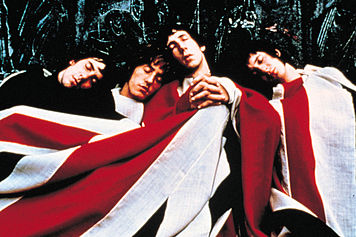
|
Favorite Songs
-
Won't Get Fooled Again
-
Pinball Wizard
-
Baba O'Riley
-
My Generation
-
I Can See For Miles
-
Eminence Front
|
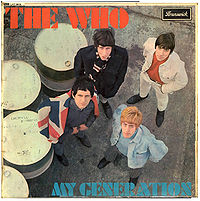 |
 |
Favorite Albums
-
My Generation
-
Tommy
-
Who's Next
-
Who Are You
|
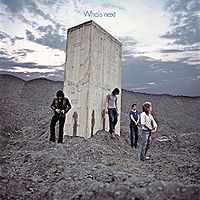 |
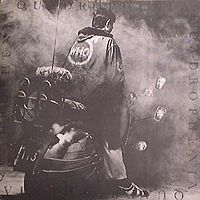 |
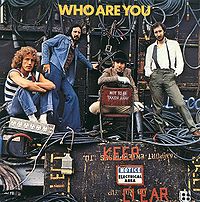 |
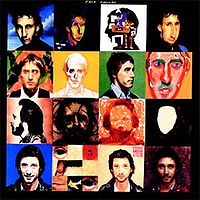 |
Home
Led Zeppelin
AC/DC Guns
N' Roses The Who
Evan Home |
|
